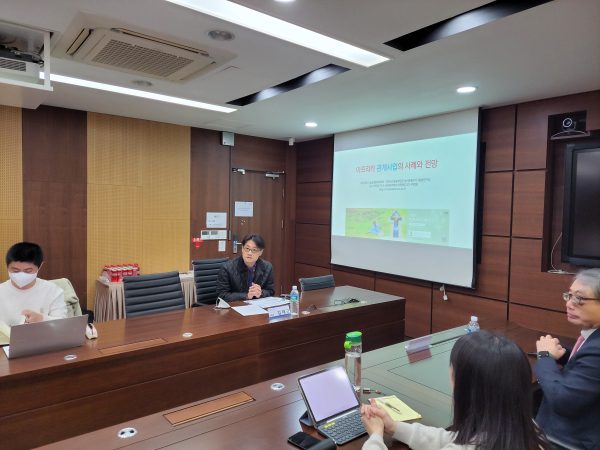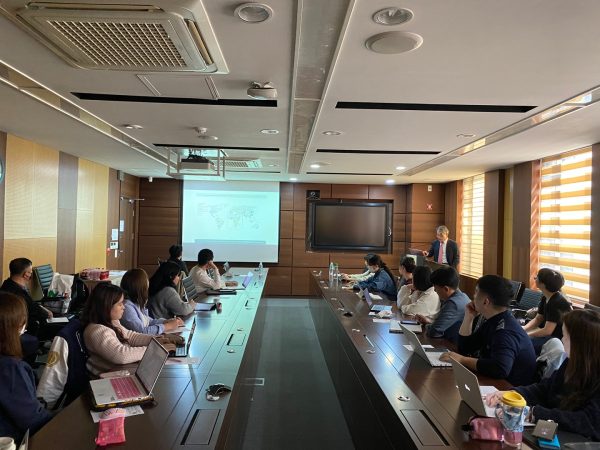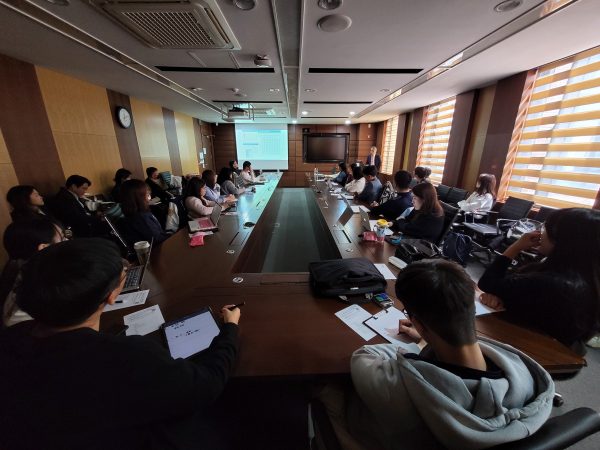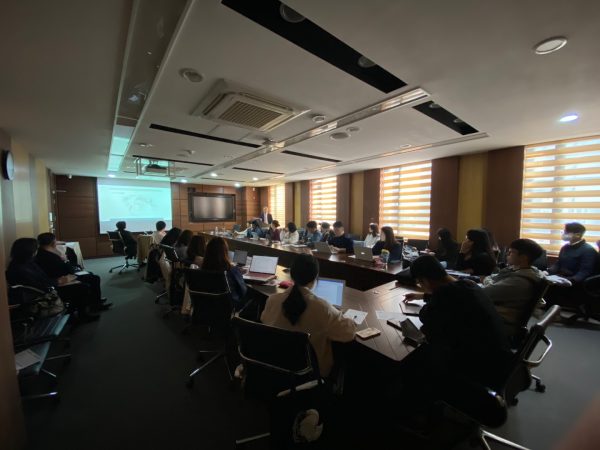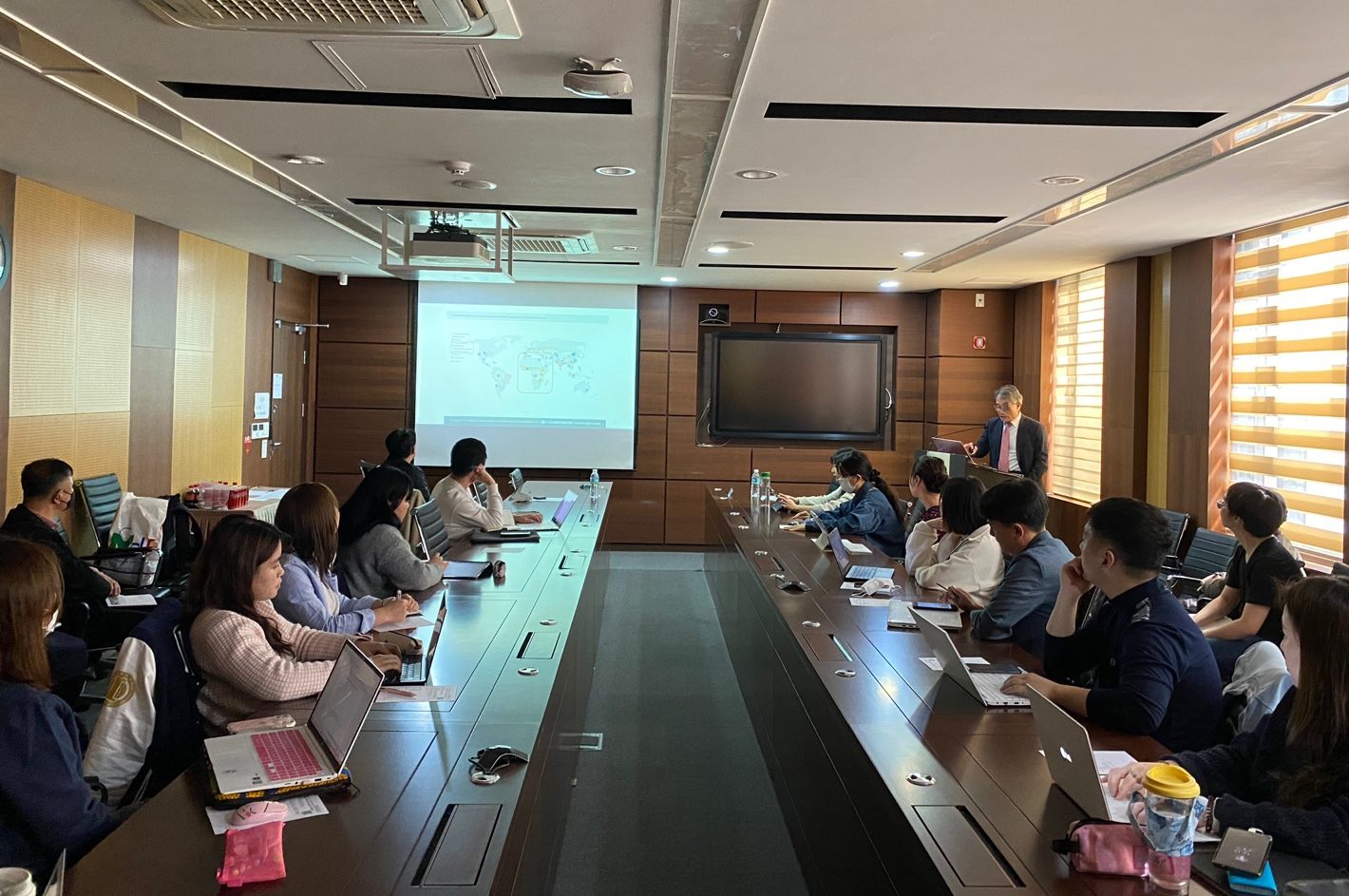행사 일정
○ 일시: 2023년 3월 24일(금), 12:00-13:30(KST)
○ 장소: 서울대학교 아시아연구소 국제회의실(303호)
○ 주제: 아프리카 관개사업의 사례와 전망
○ 강연자: 최진용 교수(서울대 농업생명과학대학 지역시스템공학전공)
행사 리뷰
서울대학교 아시아연구소 아시아-아프리카센터는 서울대학교 농업생명과학대학 지역시스템공학전공 최진용 교수를 모시고 2023년 3월 서울대 아프리카 세미나를 진행했다.
최진용 교수는 서울대학교 지역시스템공학전공학부 교수이며, 전공분야는 농촌수자원, 관개배수, ICT 응용, 기후변화적응, 물-에너지-식량 넥서스이다. 현재 농업생명과학대학에서 농어촌용수ICT융합연구실을 운영하고 있으며, 국제관개배수위원회(ICID)의 부회장으로 활동중이다.
강연은 ‘아프리카 관개사업의 사례와 전망‘이라는 주제로 진행되었고, 관개의 정의에 대한 개념 설명으로 시작되었다. 관개란 작물의 생육에 필요한 수분을 인공적으로 농지에 공급하는 일로서 농업용수 개발, 경지정리, 기계화 기반을 포함한 하드웨어적 요소와 물관리 방법, 물관리 조직을 포함한 소프트웨어적 요소가 결합되어있는 것이다. 또한 관개는 농업의 물부족을 해결하는 유일한 방법으로 농업생산성 향상, 농산물 생산 안정, 농민의 자치 역량 강화에 기여한다. 전 세계 전체 경지 면적의 20%가 관개면적이고, 이곳에서 전체 농산물의 40%가 생산된다. 경지면적의 증가는 미미하고 1인당 경지면적은 급격히 감소했으나, 관개면적의 증가 및 비료사용량의 증가로 농업생산성이 향상되어 현재에도 과거와 같은 수준의 농산물 공급이 이루어지고 있음을 설명했다. 하지만 비료 및 농약 사용량의 증가로 토양의 산성화와 병충해에 취약해짐에 따라 농업생산환경이 악화되고있는 실정이며 이로 인하여 미래 농업생산성 증가를 예측하기 어려움을 강조했다. 또한 건조지역의 관개면적 증가는 오히려 토양의 알칼리화를 가속시켜 토지의 생산성을 저하시킬 우려도 있음을 역설하였다.
최진용 교수는 지구의 물 면적 중 담수의 비율은 2.5%밖에 안되며 그 중 0.3%만이 지표면에 드러난 호수와 강으로 이루어져 있음을 설명하며 물의 순환은 매우 빠르고 지구에서 물이 차지하는 면적이 넓지만 정작 사용할 수 있는 물의 비율은 낮음을 강조했다. 전 세계 물 사용 중 70%가 관개용으로 사용되고, 20%가 산업용으로, 10%가 가정용으로 사용됨을 자료를 통해 보여주며 관개에 사용되는 물의 양이 많음을 설명하고 관개용으로 사용되는 물이 결국은 사람이 소비하는 것임을 설명하였다.
아프리카의 대부분 지역은 관개시설이 제대로 갖추어지지 않은 상태이다. 국제연합식량농업기구에 따르면 아프리카 대륙 면적 대비 관개시설의 면적 비율은 5%에 불과하다. 사하라 사막을 제외한 아프리카 대부분 지역에서는 물이 모자라진 않으나, 경제적으로 물 이용을 하지 못하기 때문에 사용가능한 물의 양이 제한적임을 설명하였다. 그리고 최근 아프리카나 개발도상국에서 많이 사용하는 물-에너지-식량 넥서스를 자료로 제시하여 물-에너지-식량의 관계를 설명하였다.
다음으로는 기후변화와 아프리카 농업 및 관개에 대해 발표를 진행하였다. 가뭄, 온난화와 같은 기후변화는 농산물 생산과 가격과 식량과 건강에 영향을 미친다. 아프리카는 자연재해 노출도와 취약도가 매우 높으며 기후에 대한 회복탄력성이 매우 낮다. 기후변화의 가장 큰 문제점은 변동성이다. 변동성에 얼마나 잘 대응하느냐가 인프라 구조에 큰 영향을 미치는데, 아프리카는 변동성에 대응할 수 있는 능력이 낮기 때문에 기후변화가 일어날 경우 농업 생산성이 저하될 것으로 예상된다. 하지만 기후변화에 대해 아프리카 권역별로 주요 작물에 미치는 영향력이 다름을 자료로 제시하였다. 그 예시로 지구 온난화가 진행되더라도 쌀의 경우 서부에서는 큰 영향이 없고, 밀의 경우 북부에서 큰 영향이 없음을 설명하였다. 아프리카에서 관개시설은 농업 생산량 증대, 일자리 창출, 기후 위험요인 감소, 여성역량강화에 잠재적 영향을 미친다. 최진용 교수는 아프리카에서 여성이 물을 긷고, 농업활동에 높은 비중을 할애함에 따라 관개시설 구축이 여성역량강화에 도움을 줄 것임을 첨언하였다.
다음으로는 국가농업지표와 농업생산성에 관해 사례를 중심으로 발표를 진행하였다. 전세계적으로 1인당 GDP가 증가함에 따라 농업종사자 및 GDP 중 농업이 차지하는 비율이 감소하는 추세를 보인다. 하지만 우간다의 사례를 제시하며 우간다는 아직 농업국가에 머물러 있음을 설명하였다.
마지막으로 탄자니아 잔지바르의 관개 개발에 관한 최진용 교수의 프로젝트 참여 사례로 발표를 진행하였다. 최진용 교수는 경험 부족, 농업생산기반시설 운영 및 유지관리 능력 부족, 낙후된 기술 및 장비, 역량 부족 등 잔지바르의 낮은 쌀 생산성이 쌀 재배 농가의 빈곤과 식량안보를 위협하는 상황에서 잔지바르 관개시설의 효과적인 활용을 위한 프로젝트를 진행하였다. 본 프로젝트는 잔지바르 내 6곳의 사업대상지를 선정하여 최종적으로 사업대상지의 쌀 생산성 향상 및 식량 안보 확보와 소득 증대 향상을 목표로 하였고 프로젝트를 통해 잔지바르 산 쌀 생산성 향상을 통한 쌀 가격 안정화, 잔지바르 청년 취업률 향상, 성평등에 기여, 지하수 오염 최소화를 기대한다고 설명하였다.
관개는 UN의 지속가능한 개발 목표 1(빈곤 퇴치)과 2(기아종식)의 개선을 위한 농업생산성 및 식량 안보 향상에 있어 필요하며, 기후변화 대응을 위한 필수사업이다. 하지만 아프리카의 낮은 기후 탄력성, 낮은 국민소득 및 높은 빈곤률, 높은 리스크 지수, 취약한 재정 등은 관개 인프라 형성 및 유지에 영향을 미칠 수밖에 없다. 다수의 아프리카 국가에서 관개 인프라가 구축되더라도 물 관리 기술과 재정이 취약하기에 낮은 지속가능성을 보인다. 따라서 아프리카 관개시설의 효과적인 유지를 위해선 유무상 지원의 연계와 지속가능성 확보를 위한 물관리 기술·조직 역량 강화 및 기계화 지원이 필요할 것임을 제시하였다. 이어서 30분간 진행된 질의응답 시간에는 중동국가와 비교하여 지하수를 사용하지 않는 이유와 나라의 환경별 관개시설의 차이, 민간 및 여성의 참여 방식에 대해 논하고, 관개시설은 나라의 기후·문화·정서·상황 등 많은 부분이 복잡하게 얽혀있고 나라마다 효율적인 방식이 다르기에 나라별로 세부적으로 접근할 필요성이 있음을 제시하며 강의를 마쳤다.
Event Review
The Asia-Africa Center of the Asia Center at Seoul National University hosted the Seoul National University Africa Seminar in March 2023 with Prof. Choi Jin-Yong of the Rural Systems Engineering Dept., College of Agriculture and Life Sciences, SNU. Prof. Choi Jin-Yong is a professor of the Rural Systems Engineering Dept. at SNU and his research interests include rural water resources, irrigation and dainage, ICT applications, climate change adapation, and water-energy-food nexus. H currently runs the Rural Water ICT Convergence Laboratory at the College of Agriculture and life Sciences, SNU, and is the Vice President of the International Commission of Irrigationa and Drainage(ICID).
The lecture titled ‘Examples and Prospects of Irrigation in Africa’ and began with a conceptual explanation of the definition of irrigation. Irrigation is the artificial supply of moisture to agricultural land for crop growth and is a combination of hardware elements, including agricultural water development, land consolidatoin, and mechanization infrastructure, and software elements, including water management methods and water management organizations. Irrigation is the only way to solve water scarcity in agriculture, contributing to increased agricultural productivity, stable agricultural production, and strengthening farmers’ autonomy. Twenty percent of the world’s total cropland area is irrigated, and 40% of all agricultural products are produced there. Although the increase in cropland area has been minimal and per capita cropland area has declined sharply, the increase in irrigated area and the increase in fertilizer use have improved agricultural productivity, resulting in the same level of agricultural supply today as in the past. However, he emphasized the difficulty in predicting future increases in agricultural productivity due to the increasing use of fertilizers and pesticides, which have made the soil more susceptible to acidification and pests. He also emphasized that the increase in irrigated area in arid regions may accelerate the alkalization of the soil and reduce the productivity of the land.
Explaining that only 2.5% of the Earth’s water surface is freshwater and only 0.3% of that is surface lakes and rivers, Prof. Choi emphasized that the water cycle is very fast and that despite the large area of water on the planet, the proportion of water available for use is low. He showed that 70% of global water use is for irrigation, 20% for industrial use, and 10% for domestic use, explaining the large amount of water used for irrigation and that water used for irrigation is ultimately consumed by humans.
Much of Africa is not properly equipped for irrigation. According to the Food and Agriculture Organization of the United Nations, only 5% of the continent’s land area is irrigated. He explained that most of Africa, with the exception of the Sahara, does not have water shortages, but the amount of water available is limited because it is not economically viable. He then explained the water-energy-food nexus that is often used in Africa and other developing countries.
The next presentation was on climate change and African agriculture and irrigation. Climate change, such as drought and warming, affects agricultural production and prices, as well as food and health. Africa has very high exposure and vulnerability to natural disasters and very low climate resilience. The biggest problem with climate change is its variability. How well we respond to variability has a huge impact on our infrastructure, and Africa’s ability to respond to variability is low, so agricultural productivity is expected to decline in the face of climate change. However, some data suggest that the impact of climate change on key crops will vary across Africa. For example, as global warming progresses, rice will not be significantly affected in the west and wheat will not be significantly affected in the north. In Africa, irrigation has the potential to increase agricultural production, create jobs, reduce climate risks and empower women. Prof. Choi added that irrigation can contribute to women’s empowerment in Africa, as women are more likely to carry water and engage in agricultural activities.
Next, Prof. Choi gave a case-based presentation on national agricultural indicators and agricultural productivity. Globally, as GDP per capita increases, the number of agricultural workers and the share of agriculture in GDP decreases. However, the case of Uganda showed that Uganda is still an agricultural country.
Finally, Prof. Jin Yong Choi presented the case of his participation in an irrigation development project in Zanzibar, Tanzania. Prof. Choi conducted a project to effectively utilize irrigation facilities in Zanzibar, as low rice productivity in Zanzibar due to lack of experience, inability to operate and maintain agricultural production infrastructure, outdated technology and equipment, and lack of capacity threatens the poverty and food security of rice farmers. The project selected six project sites in Zanzibar and ultimately aimed to improve rice productivity and enhance food security and income generation in the project sites, explaining that the project is expected to stabilize rice prices by improving rice productivity in Zanzibar, increase employment rates for Zanzibar’s youth, contribute to gender equality, and minimize groundwater pollution.
Irrigation is necessary to improve agricultural productivity and food security to advance the UN Sustainable Development Goals 1 (no poverty) and 2 (zero hunger), and is an essential project to combat climate change. However, Africa’s low climate resilience, low national incomes and high poverty rates, high risk indices, and weak finances are bound to affect the creation and maintenance of irrigation infrastructure. Even when irrigation infrastructure is built in many African countries, it is not sustainable due to weak water management skills and finances. Therefore, effective maintenance of irrigation facilities in Africa requires linking inputs and outputs, strengthening water management technical and organizational capacity, and supporting mechanization to ensure sustainability. During the 30-minute Q&A session, he discussed the reasons for not using groundwater in Africa compared to the Middle East, the differences in irrigation systems by environment, and the participation of the private sector and women, and concluded the lecture by suggesting that irrigation systems need to be approached in detail by country, as many factors such as climate, culture, emotions, and circumstances are intertwined, and efficient methods differ from country to country.
행사 사진
